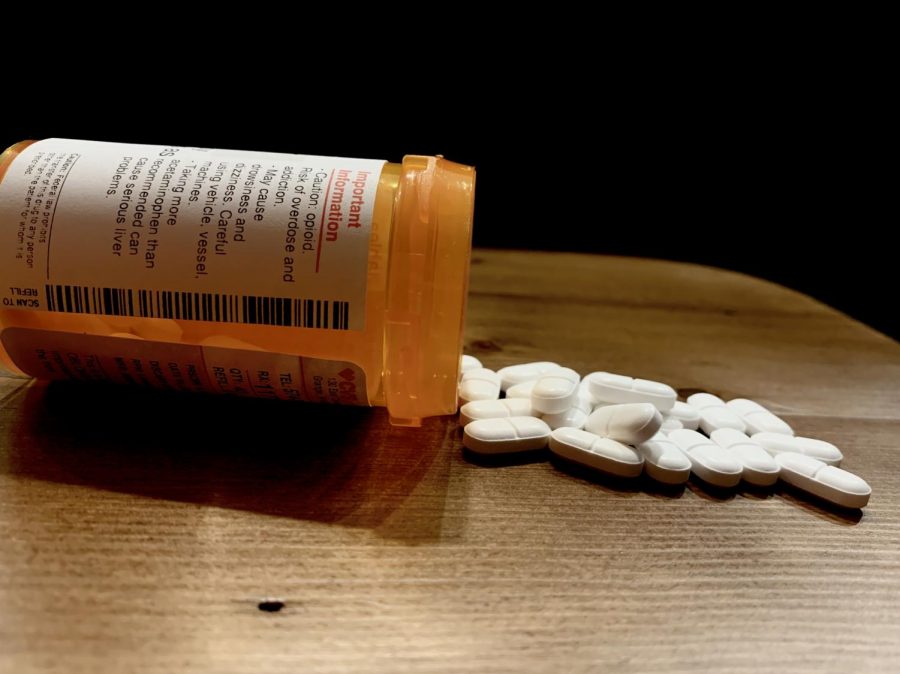The opioid crisis is no longer just affecting adults
“CAUTION: opioid, risk of overdose and addiction.” Opioids are becoming too accessible to our youth.
January 27, 2020
One in eight adolescents and young adults are prescribed opioids each year. With an annual increase greater than 170%, the hospitalization of adolescents and young adults due to opioid poisoning is beginning to surpass what looked, at first, to be an adult-only issue.
However, what started as an adult issue, is now a teen issue. Because of the overprescription of opioids, teens are being given easy access to a drug that has a high potential of addiction. As a result, if the opioid crisis is not put to an end, the future of adolescents and young adults will continue to be in jeopardy.
Due to overprescription, opioids from family members and friends have become easily accessible to teenagers.
“On a survey of postoperative patients, 67% of patients had leftover pain medications, and 92% did not receive education regarding proper disposal.”
Common instances such as these leave unused pain medications sitting in medicine cabinets or dresser drawers all around America just waiting to be misused by teens. The lack of education and proper disposal of opioids is extremely detrimental to the future of adolescents and young adults.
Additionally, it is a well-known fact that the brain does not fully develop until a person reaches 25 years of age.
According to the National Center for Biotechnology Information, “[The] 2005 National Youth Risk Behavior Survey shows that adolescents engage in behaviors that increase their likelihood of death or illness by…using illegal substances.”
This finding not only illustrates that teens are more likely to overdose when misusing opioids, but it also suggests that teens are more susceptible to addiction. Addiction can be detrimental to one’s life, especially at a young age because the brain has not fully developed and may not fully develop due to drug use.
Misusing opioids can also affect young adults and adolescents’ lives further down the road in adulthood.
In a national survey study on drug use and health in 2015 and 2016, it was discovered that
“Adolescents and young adults with any type of opioid misuse were significantly more likely to use additional substances and drugs of abuse, with a third or more reporting prior use of cocaine, hallucinogens, and inhalants, and half or more reporting past month use of tobacco, alcohol, or cannabis.”
The life after opioid misuse is no greater if one becomes addicted to other forms of drugs, tobacco, or alcohol because even though it might not kill a person as fast as an overdose, these addictions slowly destroy the body and will eventually result in death.
Addiction and misusing opioids is something not to be taken lightly, especially in adolescents and young adults whose brains are still developing, yet the lack of proper education about opioids is leading them to addiction and maybe even overdose.
The teen opioid crisis is not going to end unless actions are taken and open conversations about the dangers of opioid abuse are being had. Teens need to know that addiction can happen to everyone and that it is not just an “As Seen on TV” situation, and just because a doctor prescribes “X” amount of pain pills with a label that says “as needed” does not mean they need to take them all.
But it is not all on adolescents and young adults to educate themselves; it is also on the doctors to stop over prescribing and stop being so quick to prescribe pills without trying other methods first.
Lastly, parents and guardians should not allow their children to take prescriptions that are not prescribed to them and they should responsibly dispose of all leftover prescriptions in the household. This crisis cannot be solved overnight, but if everyone does their part, we can prevent opioid overdoses one teen at a time.
The views in this article do not necessarily reflect the views of the GENESIS staff. Email Jahlea Douglas at [email protected].








